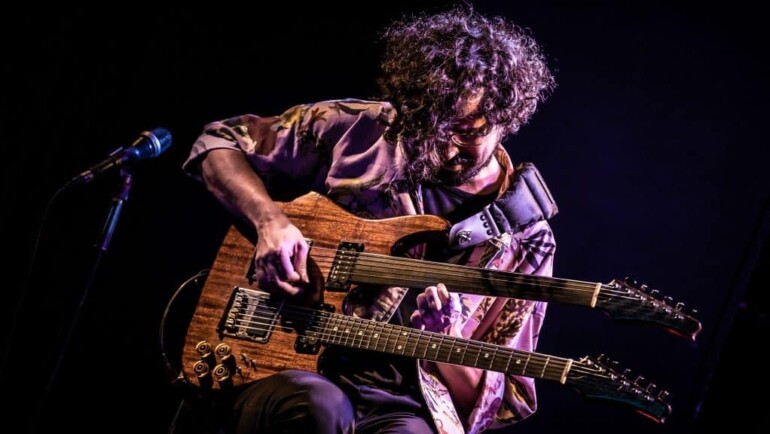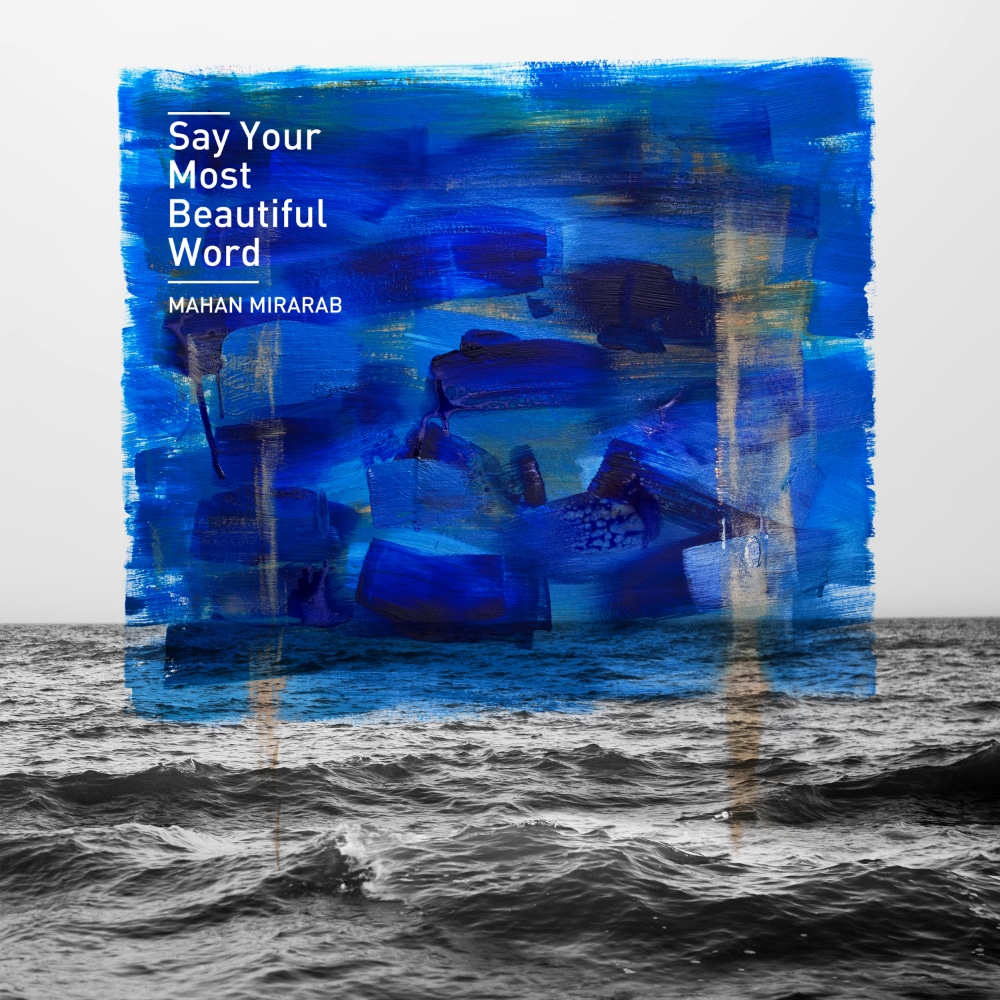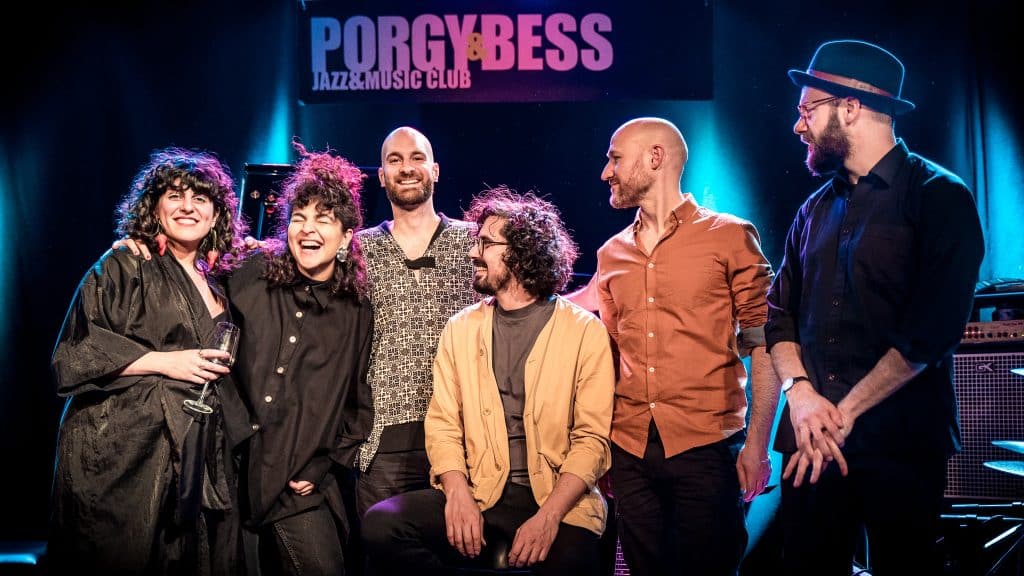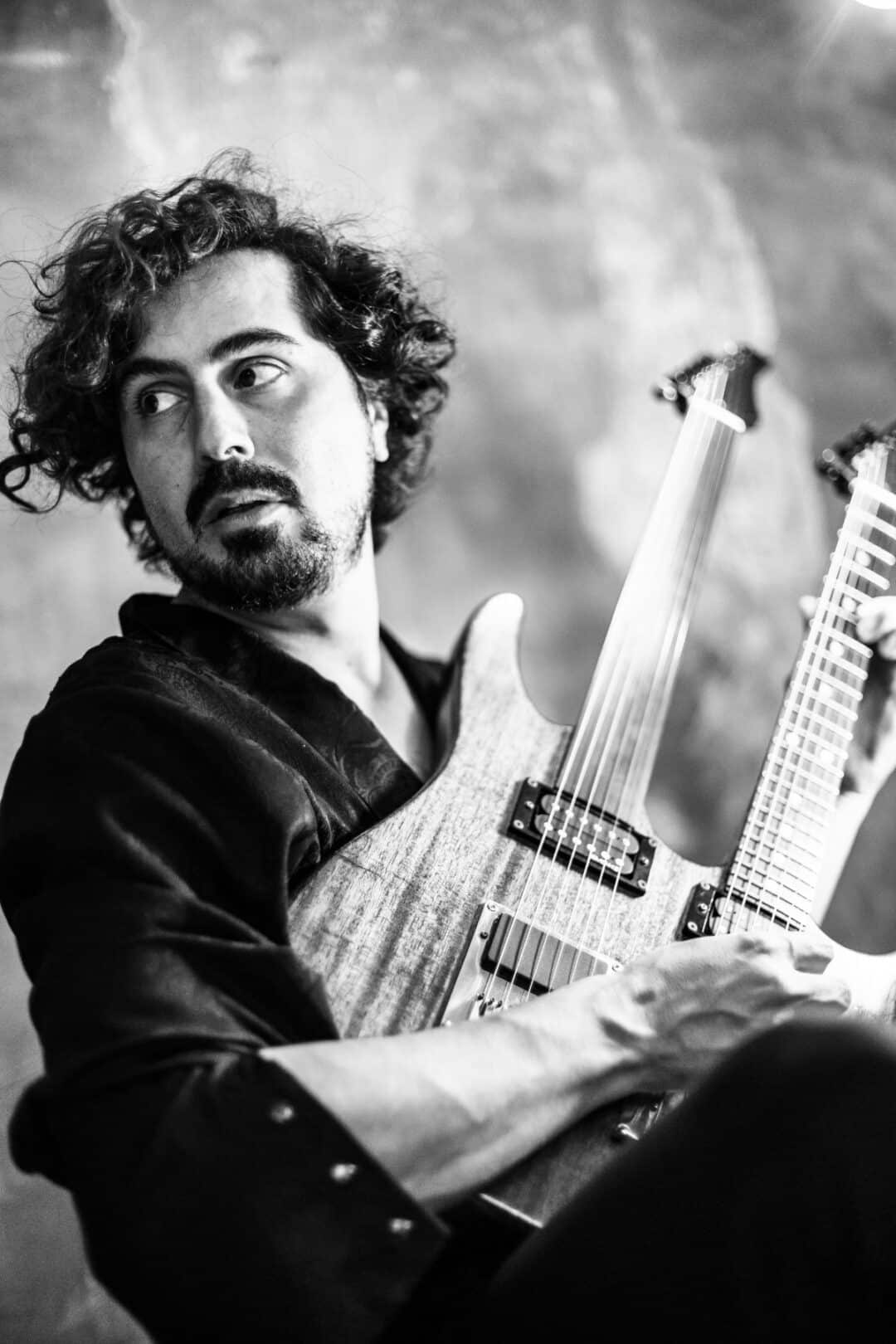
Guitarist MAHAN MIRARAB spent December 2022 in the U.S., playing several concerts on the East and West Coasts. Now we’re sitting in a crowded Café Eiles in Vienna, a table between us piled high with the plates and cups of previous guests. “Pardon me,” Mahan says to an annoyed waiter who rushes past us. Mahan smiles. “That was almost nice, by our coffeehouse standards, wasn’t it?”
With “Say Your Most Beautiful Word,” MAHAN MIRARAB recently released an album that you’d find in record stores under the category of “contemporary jazz.” Yet the classification falls far too short. Mahan, who played over 70 concerts around the world in 2022 alone, has found a way of articulating himself with the album that goes beyond playing the guitar.
When Mahan says that it depicts “his life” and can “inspire”, that he feels a “responsibility” with which comes an urge for the “new” and a “willingness to take risks”, it does not come across as if he were handling empty shells. His words resonate much more with an attitude toward life that is grounded in trust and culminates in one word: Hope.
“Say Your Most Beautiful Word” has stuck with me through the last few months because the album is so understated. It was a counterpoint to the overall state of the past year.
Mahan Mirarab: You know why? I had time to prepare before a recording, for the first time in my musical life. Not just musically – that always happens, of course – but mentally. I was able to ask myself: What am I right now? What do I expect from this project? Questions I need to answer honestly, especially for myself.

You asked these questions. What answers did you find?
Mahan Mirarab: The thing is: I feel comfortable in my work because I’m not a perfectionist. Still, I reflected on it during the lockdowns. Finally, I saw the reality – like so many other people – and asked myself: What can you do better, how do you develop?
One hears that a lot, it’s become a catch phrase. But I’ve rarely heard of people whose reflection turned into action. What was that like for you?
Mahan Mirarab: I came to terms with Vienna!
You had a conflict with Vienna before that?
Mahan Mirarab: I never hated the city, but I had bad experiences. That strained my relationship with Vienna for a long time. During Corona I was able to forgive. Maybe it took this upheaval. In any case I now know how long it takes to reach the point of forgiveness.

Because you have to accept the hurt before you can forgive it?
Mahan Mirarab: Let me answer it this way: I’ve lived in Vienna for 14 years, I’ve followed the development of the city. The Vienna of 2009 was a different one, be it humanly, socially, or in terms of integration. Especially the younger generations give me hope today. They are aware of so many things and …
… Much more reflective than we ever were at that age?
Mahan Mirarab: Exactly! That is noticeable everywhere. I think back to my early days in Vienna. Like any migrant, I didn’t know German well. Vienna is not a city that is prepared to deal with other languages. Even with English, people have a hard time here. That is still the case today, but it was even worse back then. That’s why it took me a few years to find my way around. In the meantime, I have not only mastered the language, I have also become stronger.
How old were you when you came to Vienna in 2009?
Mahan Mirarab: 25. I studied music management, but even at university there was no willingness to be flexible in the language. Solutions could have been found – even for people whose mother tongue is not German.
That is discrimination. When you say that the younger generation is developing a greater awareness of this, I have the feeling that something is happening.
Mahan Mirarab: Even in Vienna now too, yes! I lived in Berlin for some time. It was very different there. You could get by even if you didn’t speak German. But I don’t just want to emphasize language. It’s about diversity in general. Look at the ensembles or big bands in Austria. You won’t find a black person. Yet jazz in particular is about freedom and diversity! People who look different aren’t given a chance.
“You have to be a perfect musician as a foreigner – That’s not true.”
I remember a statement in an interview. You would never have dared to apply to the Jazzwerkstatt Wien – until they hired you.
Mahan Mirarab: Often that notion also resonates: You have to be a perfect musician as a foreigner. That’s not true. You can be a normal musician and still get the job. Many Iranian musicians in Vienna are overqualified. Look at Rojin [Sharafi] or Golnar [Shahyar] – they work so much hoping to get recognition for their work.
Not just so much, but: so much more.
Mahan Mirarab: Exactly! More than anyone else who takes it for granted to be seen and heard without constantly pushing.
I understand well why you say that you could forgive Vienna.
Mahan Mirarab: Yes, but I am referring to my personal experiences. Bad things happened to me here …
Do you want to talk about that?
Mahan Mirarab: No, I’d rather not. These experiences have passed, I have come to terms with them and found peace. It took long enough.
I am sorry for that!
Mahan Mirarab: Yet I am the privileged one. I come from a wealthy family, never had to work two shifts on the side – like some other students – to be able to finance myself. Despite all the bad experiences I’ve had, I’m aware of my privileges and grateful for them. They helped me to keep going. Finally, I was able to invest in my music. Not everyone has that opportunity.
You have to be able to afford the music, you mean?
Mahan Mirarab: Not only the music, but also the time it takes to meet other musicians. I was very lucky to meet Wolfi Rainer and Robert Jukic a few months after I arrived. They were a great support, with them I recorded my first album. Later I met Golnar …
… Who has been a big part of your life for years.
Mahan Mirarab: We have been working together for eleven years. You can’t imagine how much I was able to learn from her musically and on a human level.

When you think of the most beautiful word, what do you think of?
Mahan Mirarab: Hope, that’s a beautiful word.
It has longing in it. Are you a longing person?
Mahan Mirarab: Well, I always want to keep learning and experiencing new things. That goes with …
… The risk of not being able to go down certain paths that you’ve already taken.
Mahan Mirarab: Always! It needs the risk to develop further. That’s why I permanently take risks in music and don’t let myself be pigeonholed. Of course, I could have said: I come from Iran, I make Iranian music. That would fulfill all the criteria to perform at world music festivals.
“I permanently take risks in music and don’t let myself be pigeonholed.“
Yet you never did that. At the same time, you don’t disguise your origin. I’d say: you work with it.
Mahan Mirarab: I come from a capital city. European classical music dominates there. Also, we listened to pop music that came from the UK or the US. So the cultural differences are not as big as you think.
That’s not what I mean at all. I just want to say that the pop music of the 80s and 90s had a stronger focus on nationality. I’m thinking of Austro-, Italo- or Britpop. Stylistic characteristics that are streamlined today.
Mahan Mirarab: In South American countries, in many parts of Africa or in the region of former Canaan, pop music consists of many rhythms, textures and techniques that have regional backgrounds. You can acknowledge that and find your own language in it. Listen to Tigran Hamasyan, who brings Armenian stylistic devices into jazz.

Is that an appropriation or an appreciation?
Mahan Mirarab: It depends on how you perceive the cultures and what you can give back to them. Even though I love Peter Gabriel as a singer, his approach was cultural appropriation. He just took, but didn’t integrate. But that’s important. The percussionist Bernhard Schimpelsberger is a good example in Vienna. He studied music for years in India, later continued learning with his guru in the UK, learning both culture and musical language. That’s why he can give something back.
“MY MUSIC IS PERSONAL. IT CONSISTS OF A DIFFERENT CHEMISTRY.”
You sum it up nicely. Appropriation and appreciation are not mutually exclusive. It’s always a dialogue with the past in the present.
Mahan Mirarab: That’s why you have to be honest with yourself. My music is personal. It consists of a different chemistry.
What do you mean by that?
Mahan Mirarab: It’s not a job that I can just do every day. With music, you can inspire and influence people. So you have a responsibility that comes from your own philosophy.
You once mentioned a person who influenced you greatly in this regard: Wahagn Hajrapetjan. He not only taught you playing techniques, but also showed you a philosophy of life. What did you learn from him?
Mahan Mirarab: In Tehran, I was in a small jazz community. We listened to cassettes and learned the music together. Wahagn was from Armenia. He sometimes visited us and learned with us, but also taught us how important it is to develop as a person and find your own language – even if that language is crazy. As a 15-year-old, that was an important realization.
“Music became the tool to free myself”
That sounds like a liberation from convention. What was that like for you?
Mahan Mirarab: Music became the tool to free myself, yes! My mother worked as a doctor, my father was a businessman – they lived purposefully and within structures. I didn’t want that. When I played the first note on the guitar, I could see another life.
Was there already hope in that note?
Mahan Mirarab: Totally!
You broke out and made it. In doing so, you give yourself the confirmation that hope can also come true.
Mahan Mirarab: Hope is the key. Look at the current situation in Iran. Look at how women in Afghanistan are no longer allowed to study. Look at Ukraine or the Kurds in Rojava. Everything is difficult, but: people live only with hope.
I said earlier that there is a longing hidden in hope. That was wrong. In hope there is confidence in a future, isn’t it?
Mahan Mirarab: Yes, hope means power in a good sense. People who exploit power are weak. They have no power at all. My grandmother, on the other hand, had a lot of power – she was the first woman who could work in her village because she fought for it. All migrants who fight for a better life, they have power.
“inclusion is everything – also in music!”
I think it’s nice that you put it that way. It is a fight against a system that disadvantages many people because of their origin. Those who benefit from it often don’t even know it because they have never questioned their privileges. We have to raise awareness of this.
Mahan Mirarab: That’s it: How can you empower people so they can find hope? By acknowledging them, seeing them and hearing them! For that, you don’t have to look for the blame in the past. But you have to deal with the question of why some privileges are not self-evident. This creates an awareness of responsibility. Sometimes it can be little things. Do you know how much strength it gives me when my friends call me and ask about my family in Iran? I can’t describe it. You just realize that you are connected, a part of something, included.
The inclusion …
Mahan Mirarab: … Is everything – also in music! It would be more colorful and diverse than it is now. Just look at what happened in Paris. Musicians from Senegal, Cameroon, Morocco and Ghana mixed with local musicians and created a space where a strong scene could be established.
It took the will to change for that to happen, don’t you think? Here, far too often, it is not perceived. There is no hope.
Mahan Mirarab: Imagine what would happen if a little diversity was brought into jazz. Everyone would benefit! After all, jazz is not a style of music, but a way of thinking that not only can change, but must change in order to continue. I repeat myself: it’s about risk, that’s part of jazz. If you listen to Charlie Parker’s solos, you’ll find a lot of mistakes in them – that’s what’s great!
Today, it is too often suggested that every mistake could be the last one, because everything could be even better, even faster, even bigger …
Mahan Mirarab: There is no such thing as perfection. You can make music like a machine, even that is not perfect. You know, over the last 200 years, the whole world has learned European music. Now would be a good time to realize that here in Europe you can also learn – from other cultures and their styles.
“Over the last 200 years, the whole world has learned European music. Now would be a good time to realize that in Europe you can also learn – from other cultures and their styles.”
Do you feel that this willingness is there?
Mahan Mirarab: No, not at all! Individuals who are dedicated to the new do exist, of course. But otherwise I don’t see any willingness. One would only have to look around. Every musician should know Cuban and Indian rhythms. The groove, the timing, the feeling! Many musicians understand how the music works. But they have lost the connection to their body.
They analyze more than they feel, you mean?
Mahan Mirarab: Analysis is important, but the body has to move when making music. Some people think this is a European problem, but even in Iranian music, many musicians have lost the connection with their body.
“Analysis is important, but the body has to move when making music.”
Why is that?
Mahan Mirarab: Using Iran as an example, I can tell you exactly: just before the revolution, many musicians who made classical Iranian music went to Europe. There, they learned European classical music. After the end of the revolution, they returned to their homeland. A community emerged that neglected regional music. For example, they suddenly rejected the music played in cabarets. People went against tradition and followed the European model: sit up straight, don’t move, and focus only on the music.
As a result …
Mahan Mirarab: … a musical identity has died out!

When I hear your music, I don’t want to believe that. There is ratio and emotion in it.
Mahan Mirarab: I read a book by Joe Diorio, an American jazz teacher, who wrote down exercises on how to balance the left and right hemispheres of the brain. Because one side is analyzing, the other is for the physical feeling. So how do you get from analysis to emotion?
How?
Mahan Mirarab: I never write without listening; on the contrary, I try to listen first and then write. Besides, I don’t care how Mozart or Schumann composed their counterpoints. I hear what I hear – and write down when it touches me.
You trust your hearing.
Mahan Mirarab: I trust in general – also the musicians I play with. They know my arrangement, but they should play what they feel at the moment.
You express it beautifully: a trust that not everything has to be the way it is. It could always be different – because it fits better at the moment. That can be applied to many other areas of life.
Mahan Mirarab: You adapt to different circumstances and put trust in them. That opens up many spaces. Others, however, remain closed because some don’t want to open them. For example, many projects require people to read music. But what if someone can’t read music but still brings an interesting approach?
This question sums up your approach to music: It’s the willingness to engage with the other because you’ve developed a trust that good is what will be. One would hope that this would happen more often in Vienna.
Mahan Mirarab: There is hope in Vienna, too! So many skilled and talented musicians have come and are coming here. You just have to want to see it!
That is, you have to recognize the other in order to recognize your own privilege.
Mahan Mirarab: I spent the last month in the USA. Of course there are many problems there, I don’t overlook that. But I noticed: Nobody asked me about my background, it didn’t matter! This creates an environment in which special scenes can develop – whether in San Francisco or New York, people exchange ideas, experiment. Do you know how often I’ve heard in Austria that people are afraid of disappointing the audience if they try something new? Why? Because you don’t try it!
Less fear, more hope, that’s what it would take, right?
Mahan Mirarab: Of course, let’s give ourselves and each other a chance!
Thank you for your time!
Christoph Benkeser
links
Translated from the German original by Arianna Alfreds.
